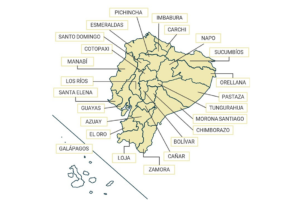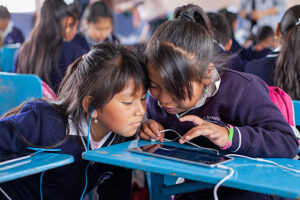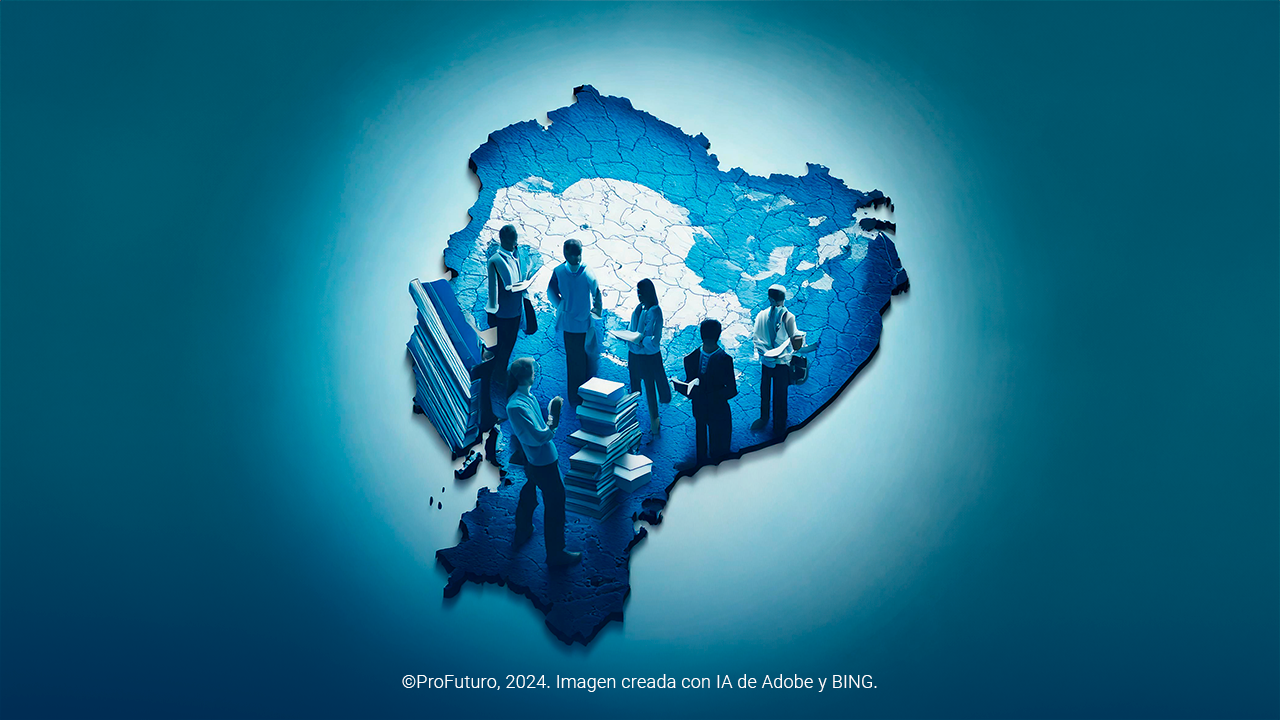During the COVID-19 pandemic, global education underwent an accelerated shift toward digitalization. Ecuador was no exception, moving overnight from a primarily face-to-face model to a virtual one. This transition highlighted the urgent need for teacher training to meet new demands.
In this context, the ProFuturo program, promoted by Fundación Telefónica and Fundación “la Caixa,” collaborated with the Ecuadorian Ministry of Education to strengthen teachers’ digital skills and improve the quality of education in the country. A recent study analyzed the results of this initiative. The article Strengthening Policies for Education, Innovation, and Digitization Through Teacher Training: Evaluating ProFuturo’s Open Model in Ecuador, published in the International Review of Research in Open and Distributed Learning, reflects on these results and their implications for educational policies.
Large-Scale Teacher Training

Between 2020 and 2022, ProFuturo conducted seven online training sessions in Ecuador, offering 198 courses totaling 1,241,211 hours of instruction. More than 563,000 teachers enrolled in these programs, with 218,054 completing certification.
The courses covered a wide range of topics, from digital skills and innovative pedagogical methodologies to leadership, communication, and digital citizenship. According to the study, 30% of the courses focused on pedagogy and methodologies, 26% on digital skills for teachers, and 13% on digital citizenship.
“The pandemic underscored the pressing need for teacher training. While digital platforms and media provided emergency solutions for continuing schooling in many cases, the need to train teachers became evident in every context,” explain the article’s authors, Miguel Massigoge-Galbis, Evaluation Director of Possible Lab, and Núria Hernández-Sellés, researcher at the Higher Center for University Studies La Salle.
Impact in the Classroom

The study analyzed teachers’ perceptions of the usefulness of the training they received and the extent of its application in educational practices.
“Up to 98.8% of the evaluations indicated the usefulness of ProFuturo’s model, which uses technology to improve educational quality,” highlight the authors.
The study found that teachers with more training hours were the ones who modified their pedagogical activities most after participating in the courses. When asked specifically about the transfer of skills to specific educational practices, the transfer rate was generally high, exceeding 78.8%, except for activities where students create and produce digital resources, which had a transfer rate of 61.3%.
“These levels of transfer to the classroom attest to teachers’ conviction regarding the usefulness of these practices, both to enhance students’ digital skills and improve curricular competencies,” the article concludes.
Improvement of Digital Competencies
To measure the impact of ProFuturo training on teachers’ digital competence levels, the researchers analyzed the results of a digital competencies self-assessment tool, comparing teachers who had received more than 150 hours of training with those who had not participated.
The results show significant differences. Teachers who completed more than 150 hours of training demonstrated a higher level of digital competence compared to their untrained peers. “This shows the program’s benefits and the fundamental role of teacher training in digital transformation processes, especially in emergency contexts like the pandemic,” affirm the authors.
The study also revealed interesting patterns regarding the groups that benefited most from the training. For instance, male teachers and those over 50 showed greater improvements in their digital competencies after training.
Además, se encontró que los docentes con más horas de capacitación fueron quienes más modificaron sus actividades pedagógicas tras participar en los cursos. Cuando se les preguntó específicamente sobre el nivel de transferencia a prácticas educativas concretas, el grado de transferencia fue en general alto, superando el 78,8%, a excepción de las actividades en las que los estudiantes crean y producen recursos digitales, que tuvieron un nivel de transferencia del 61,3%.
“Estos niveles de transferencia al aula dan fe de la convicción de los docentes sobre la utilidad de estas prácticas, tanto para mejorar las habilidades digitales de los estudiantes como para mejorar las competencias curriculares”, concluye el artículo.
The article highlights the importance for governments and educational institutions to learn from this experience and employ pre-crisis planning that leads to the transformation of the educational process.
Lessons for Educational Policies
The authors of the article highlight that the collaboration between Ecuador’s Ministry of Education and ProFuturo during the pandemic not only helped mitigate the risks inherent in the crisis but also improved teachers’ competencies and the transfer of learning to classrooms. “Given the weakness of existing structures to provide large-scale training through digital channels in an emergency context, ProFuturo’s intervention provided the necessary experience and infrastructure to address this challenge,” explain Massigoge-Galbis and Hernández-Sellés.
However, the authors emphasize that these digital transformation processes imply deep structural changes requiring complex strategies involving multiple actors within the educational system. “Unless policymakers leverage the potential benefits of research, development, and innovation, and make the necessary efforts to properly implement these projects, the global education gap will continue to grow,” they warn.
In this sense, the article stresses the importance of governments and educational institutions learning from this experience and employing pre-crisis planning that leads to the transformation of the educational process. “These collaborations between the public sector and specialized organizations can serve not only to respond to emergencies but also to initiate an institutional learning process that strengthens and equips the system, leaving the country with the necessary capacity and autonomy for self-management,” they conclude.
ProFuturo’s experience in Ecuador offers valuable lessons for strengthening educational policies and teacher training in emergency contexts and the transition to digital education. These lessons apply not only to Ecuador but also to other Latin American countries and regions with similar conditions. Here are some key lessons:
- Importance of continuous teacher training across various competencies. Teacher training must be comprehensive, covering digital skills, innovative pedagogical methodologies, communication, leadership, and digital citizenship. This enables teachers to play multiple roles in the digital classroom, such as facilitators, instructional designers, and technology managers. ProFuturo’s experience showed that well-trained teachers in these areas are more effective in transferring these skills to their daily practices.
- Adaptability and resilience in emergencies. The pandemic highlighted the need for flexible educational systems that can adapt quickly. The collaboration between ProFuturo and the Ecuadorian Ministry of Education mitigated educational disruption through the rapid implementation of digital courses and tools. This quick-response approach underscores the need for pre-established educational contingency plans and the right digital infrastructure to reach all teachers.
- Using technology as a tool for collaborative learning. A significant takeaway is the value of collaborative learning in digital environments. The study indicated that most teachers applied collaborative methods in their classrooms, fostering more inclusive and active learning. Training in collaborative technologies helps teachers promote skills such as teamwork and communication, which are essential in a digital context.
- Value of self-assessment and feedback to improve competencies. The use of self-assessment tools allows teachers to reflect on their skills and track their progress, as seen in the ProFuturo initiative. This process also provides valuable data for educational systems, helping identify areas where teachers need more support. Self-assessment should be integrated into teacher training programs to foster continuous learning and professional improvement.
- Development of public-private collaboration models. ProFuturo’s experience shows how public-private collaborations can be crucial in quickly implementing large-scale training programs. These partnerships bring not only financial resources but also technical expertise, digital infrastructure, and access to global knowledge networks. For other countries, fostering such partnerships could be a viable way to strengthen their educational capacities and bridge digital gaps in vulnerable areas.
- Decentralization of resources and focus on autonomy. A key lesson is the need to decentralize training and digital resources to reach all contexts. In Ecuador, most trained teachers were from public institutions, many in rural areas with limited technology access. Investing in models that promote local educational autonomy — training teachers to self-manage — contributes to a more resilient and equitable educational system.
- Long-term sustainability and preventive planning. Changes in education should not be limited to emergency solutions. ProFuturo’s experience highlights the need for long-term, sustainable policies that keep teacher training up-to-date and integrate technology as a regular part of educational practice. These policies should include the necessary infrastructure and resources, so educational systems can respond effectively to future crises.
- Attention to demographic differences in teacher training. ProFuturo’s training highlighted differences in skill improvement by gender, age, and previous experience. Teachers over 50 and male teachers showed higher improvement levels in digital competencies post-training. This suggests that training programs should consider the needs and characteristics of diverse groups, ensuring equitable skill enhancement across all teachers.
References
Hernández-Selles, N. & Massigoge-Galbis, M. (2024). Strengthening Policies for Education, Innovation, and Digitization Through Teacher Training: Evaluating ProFuturo’s Open Model in Ecuador, International Review of Research in Open and Distributed Learning, 25(4):1-18. DOI:10.19173/irrodl.v25i4.7865






